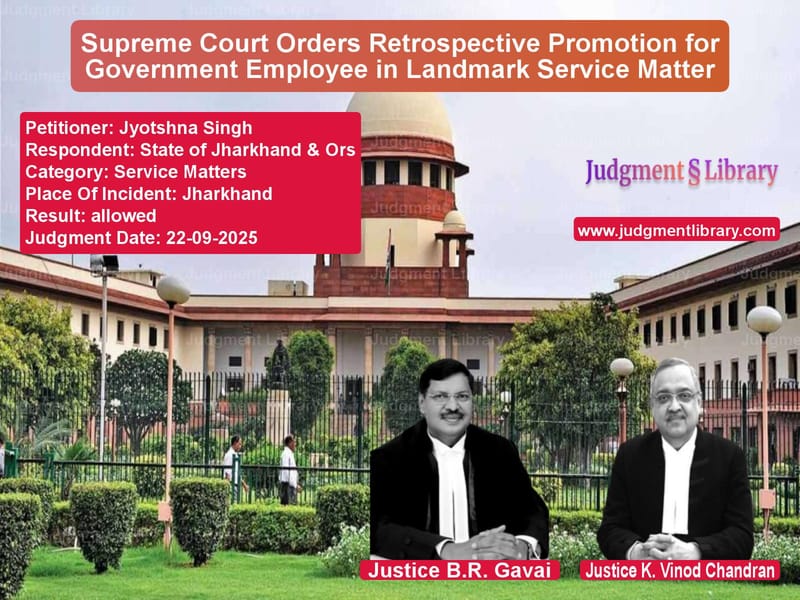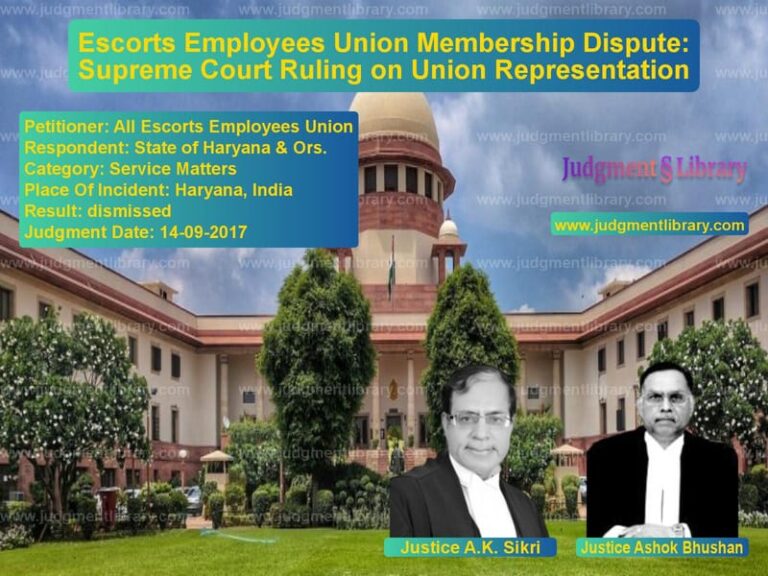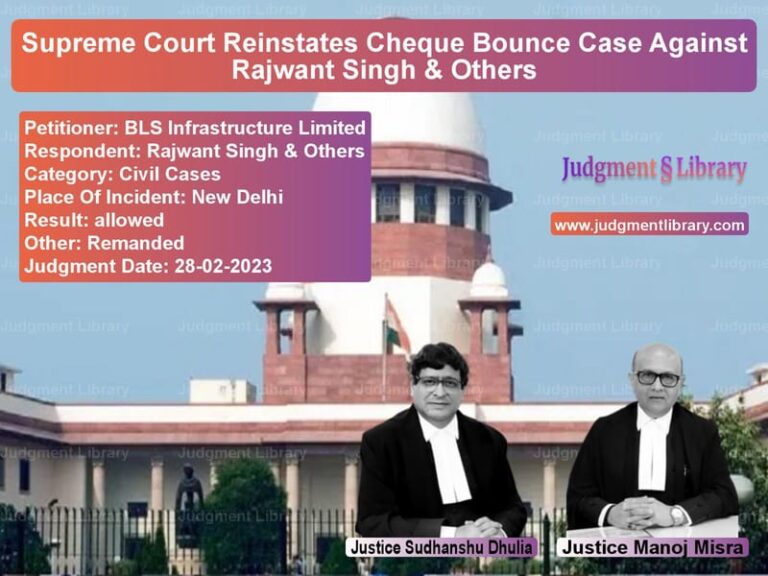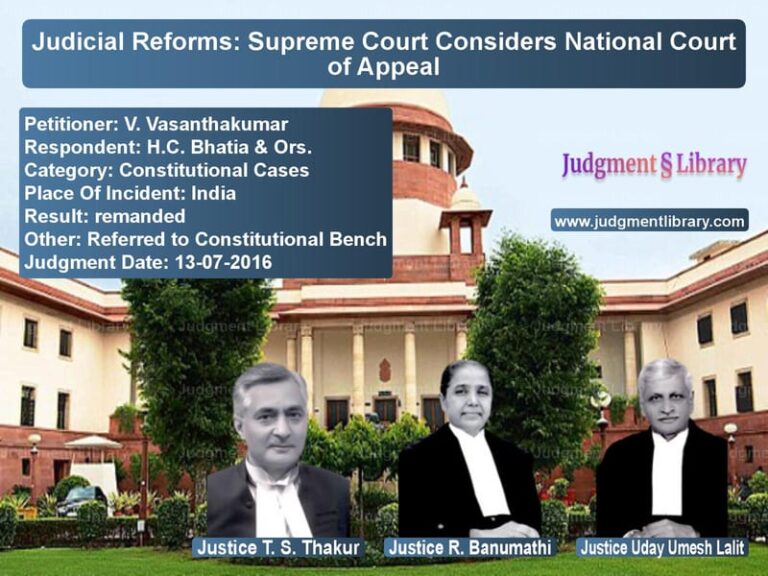Supreme Court Orders Retrospective Promotion for Government Employee in Landmark Service Matter
In a significant judgment that reinforces the rights of government employees against delayed and unjust disciplinary proceedings, the Supreme Court of India recently delivered a powerful verdict ensuring justice for a retired administrative officer who suffered due to departmental proceedings initiated after an unexplained delay of ten years. The case highlights the critical importance of timely disciplinary actions and the consequential rights of employees when such proceedings are found to be fundamentally flawed.
The legal battle involved Jyotshna Singh, who was working as a Block Development Officer in the Jharkhand State Administrative Service. While posted at Chandwa Block, she noticed improper entries in the cash book and took appropriate action by initiating proceedings against the Nazir of the Block and reporting the matter to the Deputy Commissioner. Despite her diligent handling of the situation, she later became embroiled in departmental proceedings that would span over a decade and ultimately affect her promotional prospects.
The Background of the Case
The controversy began when an Audit Team from the office of the Accountant General raised an objection regarding an excess payment of Rs. 5,60,000/-, suggesting it could be misappropriation. However, the Deputy Commissioner of Latehar conducted a thorough investigation and “categorically found that there was no reason to find embezzlement and the money expended was within the estimated cost.” The State Audit Team accepted this report on July 17, 2009, and the appellant continued her service without interruption, receiving due promotions.
However, in a surprising turn of events, “Much later, on 25.05.2017, a charge-sheet was issued by the Deputy Commissioner, Latehar relating to the embezzlement pointed out as an objection by the Audit Team of the office of the Accountant General.” This initiation of proceedings came nearly ten years after the original audit objection, which had already been properly explained and resolved.
The Legal Challenge and Initial Victory
The appellant challenged the disciplinary proceedings before the High Court, which found substantial merit in her contentions. The Court noted that “the allegation in the charge-sheet regarding interpolations in the cash book was properly explained by the appellant.” More importantly, the Court observed that “the State led no evidence in the departmental enquiry to prove the charge and the enquiry officer merely relied on some documents produced which were not marked or proved.”
Relying on established legal precedents, including Roop Singh Negi v. Punjab National Bank and Others and State of Madhya Pradesh v. Bani Singh and Another, the High Court “set aside the entire departmental proceedings including the penalty imposed and directed consideration of her promotion with retrospective effect and all consequential benefits.” The Court particularly faulted the State for initiating proceedings after “a lapse of about 10 years” from the original audit objection raised on July 27, 2007.
The Contempt Proceedings and Supreme Court Intervention
Despite the clear directions from the High Court, the State failed to implement the judgment properly. The appellant was promoted to the post of Joint Secretary only on November 30, 2022, while her immediate junior, Mrs. Uma Mahato, had been promoted on March 13, 2020. The State’s attempt to justify this delay formed the crux of the contempt proceedings that eventually reached the Supreme Court.
The State argued that “the appellant was promoted to the post of Additional Collector only on 19.05.2015 and the rules required a minimum of 5 years’ service for promotion to the next post of Joint Secretary.” They contended that during the Departmental Promotion Committee meeting on March 13, 2020, “the appellant was under the rigor of punishment imposed in departmental proceedings” and therefore ineligible for relaxation of the minimum service requirement.
Supreme Court’s Reasoning and Final Verdict
The Supreme Court, comprising Chief Justice B.R. Gavai and Justice K. Vinod Chandran, strongly disagreed with the State’s position and the Division Bench’s handling of the contempt petition. The Court noted that “the Division Bench egregiously erred in rejecting the contempt petition.”
The Court made several crucial observations that formed the foundation of its decision. Firstly, it emphasized that “the punishment has been set aside and the departmental proceeding found to be in violation of established principles.” Since the entire disciplinary proceeding had been declared invalid, the punishment imposed therein could not be used to deny the appellant her legitimate rights.
The Court specifically addressed the State’s argument about minimum service requirements, noting that “Mrs. Uma Mahato, junior of the appellant was considered on 13.03.2020, obviously after granting relaxation.” Since the junior officer had received relaxation, the appellant was equally entitled to the same benefit, especially considering that “the denial of consideration of the appellant was only on account of the punishment imposed” which had been subsequently invalidated.
The Court delivered a clear and unambiguous directive: “The appellant should be considered for promotion from the date on which her immediate junior, Mrs. Uma Mahato was considered in the DPC.” This meant the appellant was entitled to retrospective promotion from March 13, 2020, rather than the belated promotion granted in 2022.
Comprehensive Relief Granted
Recognizing that the appellant had already retired on December 31, 2023, the Supreme Court ensured that she received complete justice. The Court directed that “the appellant is also entitled to consequential benefits as directed in LPA No.467 of 2022 which includes the entire pay and allowances and also, in the event of the appellant having retired, fixation of pension as per the last pay drawn on the retrospective promotion granted.”
The Court set a strict timeline for compliance, ordering that “the above exercise shall be completed within a period of four months and the entire amounts due shall be paid to the appellant within the stipulated time.” To ensure accountability, the Court added a significant provision: “if the failure to comply with the directions in this judgment is by any officer/s of the State, the State shall be free to recover the additional liability of interest from such officers/employees occasioning the delay after issuing notice and taking appropriate proceedings against the said officers/employees.”
This judgment serves as a powerful reminder that when departmental proceedings are conducted in violation of established principles and with inordinate delay, the affected employee must be restored to the position they would have occupied had the illegal proceedings never occurred. The Supreme Court’s decision reinforces the principle that legal victories must translate into tangible benefits for litigants, especially when they have suffered due to systemic failures and procedural irregularities in disciplinary mechanisms.
The Court’s approach in this case demonstrates its commitment to ensuring that justice is not merely theoretical but practical and complete, particularly for retired employees who have limited time to enjoy the fruits of their legal victories. This judgment will undoubtedly serve as an important precedent for similar cases where employees suffer due to delayed and procedurally flawed disciplinary proceedings.
Petitioner Name: Jyotshna Singh.Respondent Name: State of Jharkhand & Ors.Judgment By: Justice B.R. Gavai, Justice K. Vinod Chandran.Place Of Incident: Jharkhand.Judgment Date: 22-09-2025.Result: allowed.
Don’t miss out on the full details! Download the complete judgment in PDF format below and gain valuable insights instantly!
Download Judgment: jyotshna-singh-vs-state-of-jharkhand-&-supreme-court-of-india-judgment-dated-22-09-2025.pdf
Directly Download Judgment: Directly download this Judgment
See all petitions in Promotion Cases
See all petitions in Employment Disputes
See all petitions in Public Sector Employees
See all petitions in Disciplinary Proceedings
See all petitions in Judgment by B R Gavai
See all petitions in Judgment by K. Vinod Chandran
See all petitions in allowed
See all petitions in supreme court of India judgments September 2025
See all petitions in 2025 judgments
See all posts in Service Matters Category
See all allowed petitions in Service Matters Category
See all Dismissed petitions in Service Matters Category
See all partially allowed petitions in Service Matters Category







